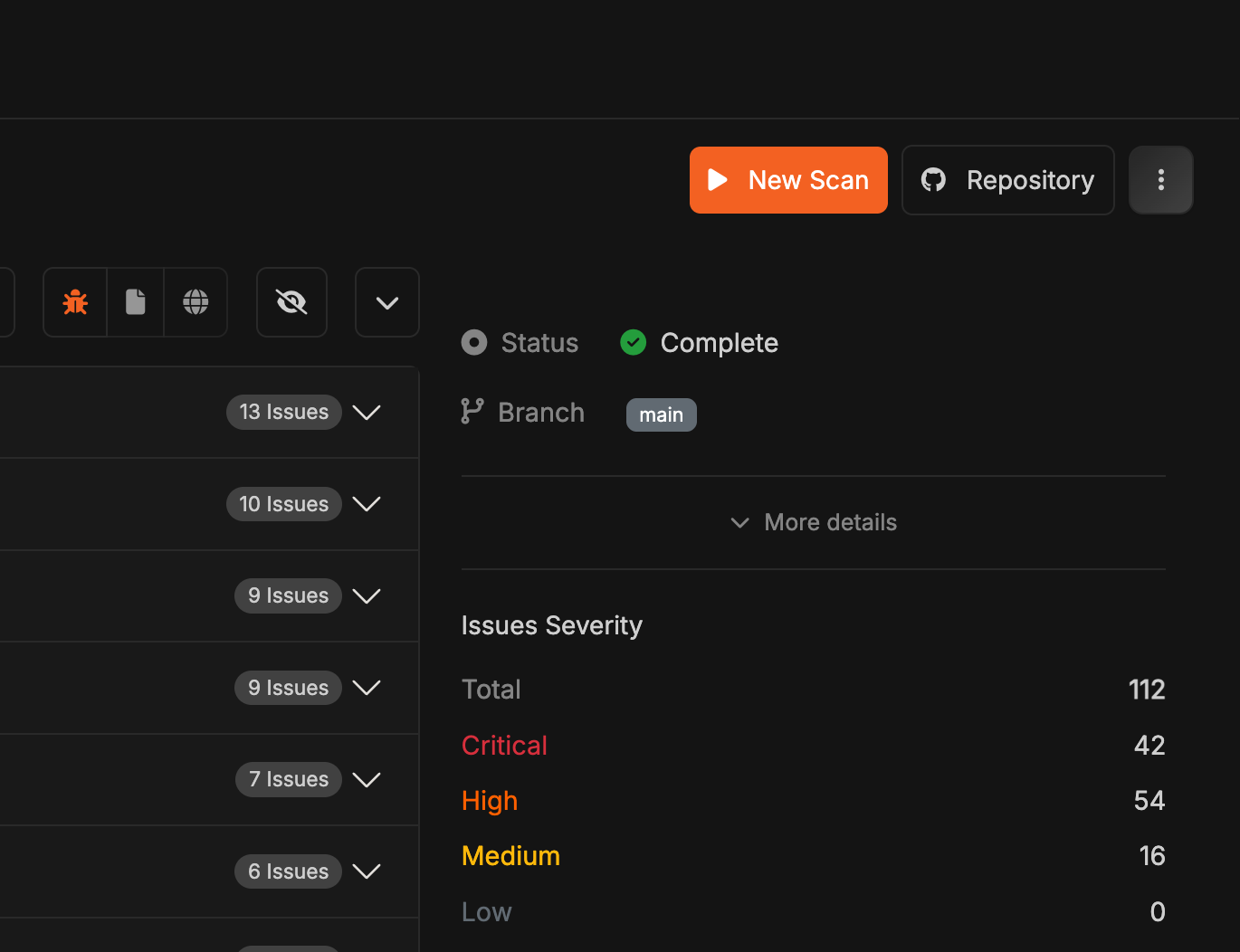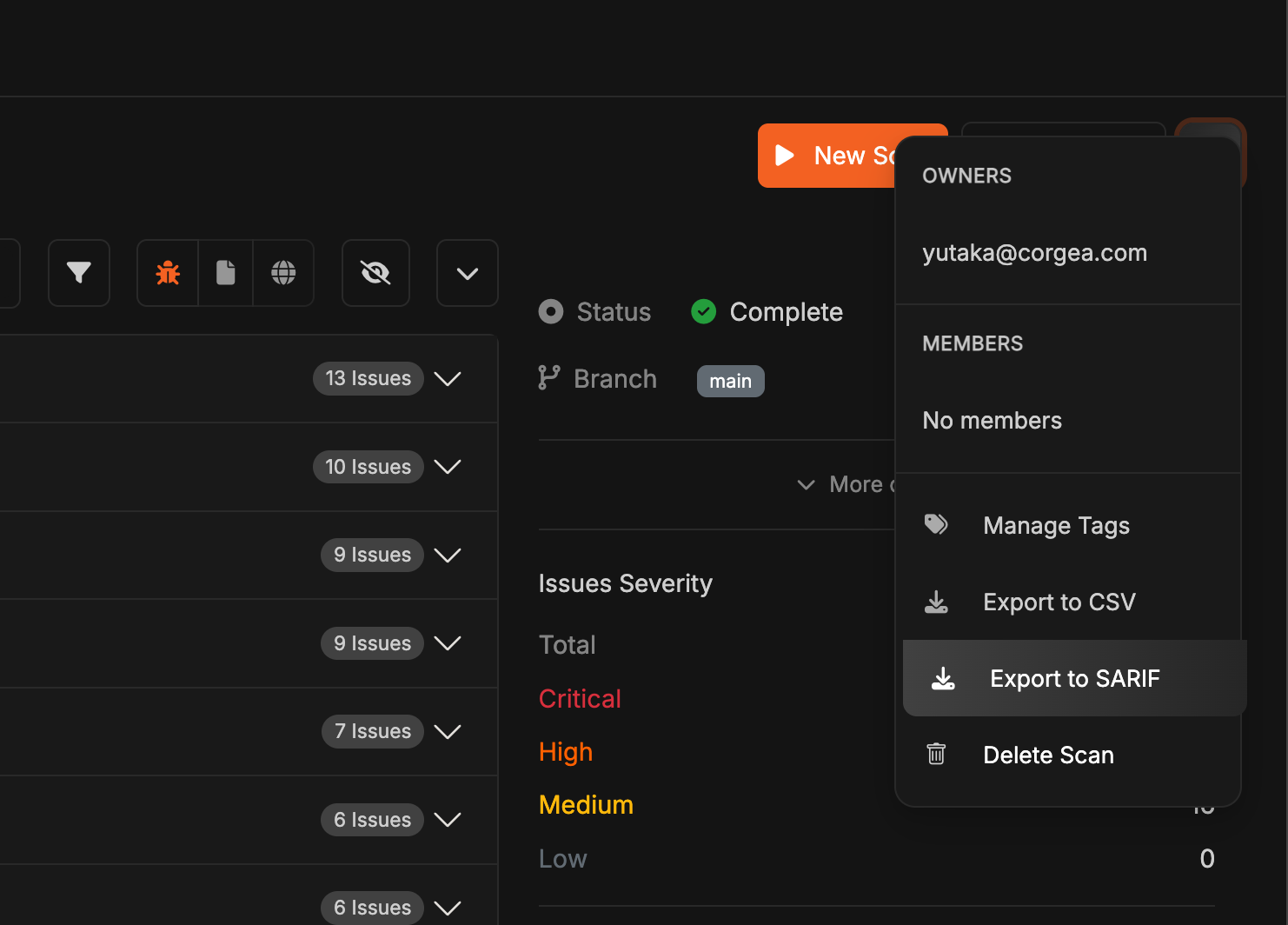Overview
Corgea provides multiple export options for your security findings, allowing you to integrate with various tools and workflows. You can export scan results in industry-standard formats for further analysis, reporting, or integration with other security tools.Export Formats
SARIF Export
SARIF (Static Analysis Results Interchange Format) is an industry-standard format for representing the output of static analysis tools. Corgea supports exporting scan results in SARIF 2.1.0 format, making it easy to integrate with various security tools and CI/CD pipelines.How to Export to SARIF
Navigate to Scan Results
Go to your project’s scan results page where you can see all detected security issues.

SARIF Report Structure
The exported SARIF report follows the SARIF 2.1.0 specification and includes:- Tool Information: Details about Corgea as the scanning tool
- Rules: Definitions of security vulnerabilities detected, including CWE classifications
- Results: Individual security findings with locations and metadata
Sample SARIF Report
You can view a complete sample SARIF report here: Sample SARIF Report The sample report demonstrates how Corgea exports various security vulnerabilities including:- SQL Injection (CWE-89)
- Cross-site Scripting (CWE-79)
- Path Traversal (CWE-22)
- Missing Authorization (CWE-862)
- And many other common security vulnerabilities
CSV Export
CSV (Comma-Separated Values) format provides a simple, spreadsheet-compatible export option for your security findings. This format is ideal for:- Creating custom reports and dashboards
- Importing into business intelligence tools
- Sharing findings with stakeholders who prefer tabular data
- Performing bulk analysis in spreadsheet applications
- Issue ID and Scan ID for tracking
- Project name and classification details
- Vulnerability type (CWE classification) and urgency level
- File location, line number, and programming language
- Issue description and severity ratings
Sample CSV Report
You can view a complete sample CSV report here: Sample CSV Report The CSV format includes these columns:- Issue ID: Unique identifier for each security finding
- Scan ID: Identifier linking findings to specific scan runs
- Project Name: Name of the scanned project
- Classification ID: CWE identifier (e.g., CWE-89 for SQL Injection)
- Issue Classification: Human-readable vulnerability name
- Urgency: Priority level (CR=Critical, HI=High, ME=Medium)
- File: Path to the affected source code file
- Line Number: Specific line where the issue was detected
- Language: Programming language of the affected file
PDF Export (Coming Soon)
PDF export functionality is currently in development and will be available soon. This feature will provide:- Professional, formatted reports suitable for executive summaries
- Detailed vulnerability descriptions and remediation guidance
- Charts and visualizations of security findings
- Customizable report templates
Integration Benefits
SARIF Integration Advantages
- Tool Compatibility: SARIF files can be consumed by various security tools, IDEs, and CI/CD systems
- GitHub Integration: GitHub natively supports SARIF for security alerts and code scanning
- Standardized Format: Industry-standard format ensures compatibility across different platforms
- Rich Metadata: Includes detailed location information, severity levels, and remediation guidance
Use Cases
- CI/CD Pipeline Integration: Automatically process SARIF reports in your build pipeline
- Security Dashboard Integration: Import findings into centralized security management platforms
- Compliance Reporting: Generate standardized reports for security audits and compliance requirements
- Developer Workflow: Integrate with IDEs that support SARIF for inline security feedback
Best Practices
- Regular Exports: Set up regular exports to track security improvements over time
- Version Control: Store exported reports alongside your code for historical tracking
- Automated Processing: Use SARIF exports in automated workflows for continuous security monitoring
- Tool Integration: Leverage SARIF compatibility to integrate with your existing security toolchain

